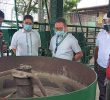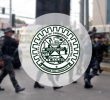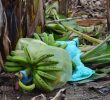At the start this week of the marathon hearings on the injunction the banana industry has filed against Davao City�s ban on aerial spraying, the banana companies allegedly misrepresented data or outrightly lied about them in order to mislead the court and the public about the pesticides they use and how they use them. |
Related special report: Blood Banana
DAVAO CITY — First, they argued that a ban on aerial spraying will force them to retrench workers. Then they said switching to ground spraying will entail added cost. They also claimed that it is impossible for the wind drifts of an airplane to contaminate rivers and drinking water and threaten the lives of people and animals.
The banana companies in the city raised these assertions in their effort to stop the implementation of city ordinance that bans the aerial spraying of pesticides on banana plantations.
But at the start this week of the marathon hearings on an injunction filed by the banana industry against City Hall to stop the full implementation of the ban, which is scheduled for implementation in June this year, the banana companies seemed to have contradicted themselves, if not outrightly lied or misrepresented data before the court, according to the environment group Interface Development Interventions Inc. (IDIS), which has fought for the implementation of the ordinance.

Poisoned? A worker at a Compostela Valley banana plantation points to the pesticide being sprayed by airplanes on the banana plantations in that province and in Davao City. According to residents near the plantation, the aerial spraying not only contaminated their sources of water but also destroyed the ecological system, as evidenced by pests that used to be found in banana plantations transferring to other crop areas such as rice and corn. (davaotoday.com photo by Carlos H. Conde)
In her sworn testimony, Maria Victoria Sembrano, chair of the finance committee of the Pilipino Banana Growers and Exporters Association (PBGEA) and chief of the corporate services division of Marsman Drysdale Agribusiness Corp., tried to convince the court that the ban would have adverse economic and financial impact on Davao City.
The industry, Sembrano said in her affidavit, �accounts for at least 75 percent of the total export revenue of Davao City. Banana exports account for approximately US$617 million in export earnings for 2004 and approximately US$713 million in export earning for 2005 for Davao City.�
Sembrano also said that the banana industry in the Davao City employed 4,955 in 2004. The number, she added, increased more than three-fold — to 15,968 jobs � in 2005.
She cited as her source a report made by the Department of Trade and Industry to the Economic Development Committee of the Southern Mindanao Regional Development Council.
The problem is, these figures not only covered Davao City but the entire region, which covers several provinces and other cities. The ban only applies to Davao City. Melchor Quitain, head of the Davao City Legal Office, immediately saw the misrepresentation in PBGEA�s data and pointed this out to Sembrano, who admitted that the figures were inaccurate.
�Well, I am sorry but unfortunately the statement here conferred to you as stated as Davao City when reality the data pertaining to US$615 million in export earning for 2004, US$713 million export earnings in 2005 refers to the Davao Region,� Sembrano said. Sembrano said these figures �actually missed my attention.� She then apologized.
While there are banana companies operating within Davao City, most of the country�s banana exports are from the other provinces in the region, most notably Davao del Norte, Compostela Valley and Davao del Sur. Environmentalists said PBGEA deliberately bloated its figures in order to present the supposed dire economic consequences of the ban.
To bolster the companies’ argument for the injunction, Sembrano also said that a ban on aerial spraying will force banana companies to hire thousands of additional workers because ground spraying entails a lot of work.
Sembrano, meanwhile, said during Tuesday’s Regional Trial Court hearing that banana companies will need thousands of workers if aerial spraying is banned in the city.
“We need to hire three more people per hectare to do manual spraying,” according to Sembrano. “The existing 7,000 workers will still have to do their jobs but new workers can be easily hired,” she said at the witness stand.










